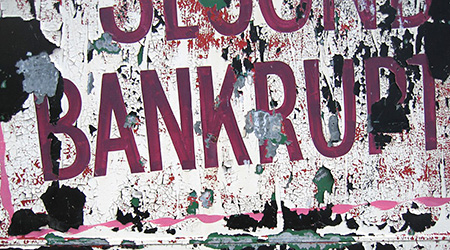Can People Be Denied Bankruptcy?

Filing for bankruptcy is not a guarantee that you will successfully be able to discharge debt or other obligations in a bankruptcy procedure. The only thing filing for bankruptcy does is allow you to get the ball rolling and present your case in court to determine whether or not you qualify. The Bankruptcy Abuse Prevention and Consumer Protection Act of 2005 (BAPCPA) changed some of the qualifications as well as what debt is and is not allowed to be discharged. This is meant to prevent abuses and make sure serial filers or individuals who run up tens of thousands of dollars in credit card debt are not able to just walk away from their obligations.
The entire purpose of the BAPCPA was to make it more difficult for individuals and businesses to file for bankruptcy and discharge debt. In many cases it is not only more difficult for individuals and businesses to qualify for bankruptcy but if they do it is more likely they will be required to file Chapter 13 instead of Chapter 7 proceedings. This is because under Chapter 7 debt can be liquidated and the individual or business starts with a clean slate. Whereas with Chapter 13 the party must reorganize their obligations and pay secured creditors as well as credit lenders which was a big win for the banking industry. This is because many individuals would rack up significant amounts of debt, especially on unsecured credit cards, and then immediately file for bankruptcy leaving financial institutions with a complete loss.
Another reason why people may be denied bankruptcy protection is if they are perceived to be abusing the system by becoming serial filers. In many cases where an automobile or primary residence is being repossessed or foreclosed upon, filing for bankruptcy can stop this action. This is because bankruptcy code has what is called a homestead exemption in many states also exempt the primary vehicle as it may be necessary for continued employment or other requirements such as for children or medical necessity. What happens however is some individuals know this and will use the delays created by filing for bankruptcy to their advantage since paying the bankruptcy filing fee can be significantly less than a mortgage or auto payment.
The Bankruptcy Abuse Prevention and Consumer Protection Act of 2005 also includes the requirement for a means test on the filer. A means test compares the bankruptcy filers income and assets to an average to determine whether or not they have an ability to pay outstanding debt obligations. This is part of the reason many individuals can be denied Chapter 7 and forced into Chapter 13 assuming they qualify. This again was meant to prevent individuals who have significant assets from filing for bankruptcy and write off debt they had no intention of repaying in the first place.
So to answer the question "can people be denied bankruptcy?" The answer is yes. Since the new bankruptcy law passed in 2005 it has become significantly more difficult and expensive to file for bankruptcy. The new provisions also limit an individuals and businesses ability to liquidate debt serving as a disincentive for filing. These are important considerations which should be discussed with a qualified bankruptcy attorney since it may alter your decision to file. If there is a high likelihood that a person is going to be denied bankruptcy protection then it would be more cost and time effective to deal with creditors directly and possibly enlist the services of a national nonprofit credit counseling agency or debt consolidation organization. Filing for bankruptcy isn't the guarantee it used to be and knowing this beforehand may persuade some individuals and businesses to act accordingly when evaluating options.







